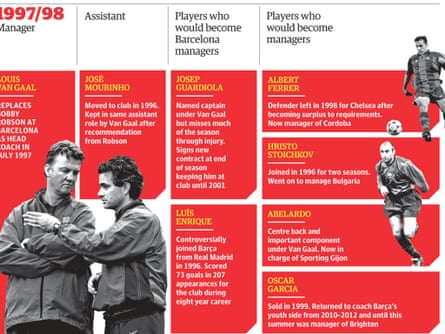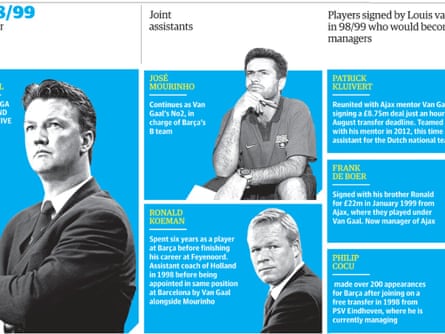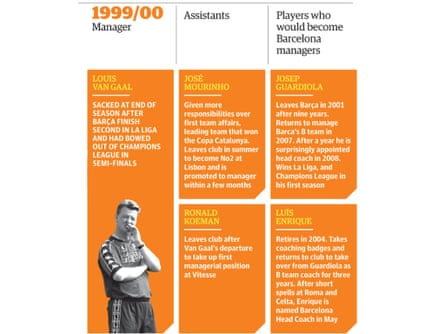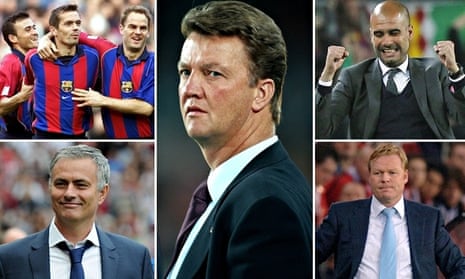In 1997, Louis van Gaal arrived at Barcelona. He had initially been approached to be youth coordinator but with Bobby Robson’s side struggling in the league – despite winning both the Copa del Rey and the Cup Winners’ Cup – he was asked to take over as manager, with Robson taking on an ambassadorial role, becoming, as he put it “the world’s highest-paid scout”.
On Robson’s recommendation, Van Gaal took on José Mourinho, who had become far more than a translator, to be his “third assistant”. In his midfield, he had Pep Guardiola and Luís Enrique. A year later, Phillip Cocu joined the midfield and Ronald Koeman arrived as an assistant coach. Frank de Boer was signed the year after that. Or, to put it another way, in 1999-2000, the present managers of Barcelona, Bayern Munich, Manchester United, Chelsea, Ajax, PSV Eindhoven and Southampton were all either playing or working at Camp Nou.
The story is told of a senior British sports writer seeing Van Gaal at a dinner. A huge fan, he dashed over. “This man,” he said to his wife, by way of introduction, “is one of the greatest coaches of all time. He invented modern football.” Alarmed he may have gone too far, he looked at Van Gaal in embarrassment. Van Gaal just nodded.
Perhaps he didn’t quite invent modern football, but his significance in shaping large numbers of modern coaches can hardly be denied. “I’m not sure he is the best coach in the world as he keeps saying, but certainly one of the best,” Guardiola said. “I learned a lot with him. I would have to ask him, though, would he do things the same way if he had to do it all over again?” Van Gaal’s first two seasons at Barcelona each brought the league title; his third, undermined by rows with Rivaldo and frustration at his intransigence, ended in acrimony and his departure.
Of course, to an extent, the concatenation of talent at Camp Nou was a natural consequence of the links between Barcelona and Ajax. Even Robson is connected to that line: at West Bromwich Albion he played under Vic Buckingham, the first man to coach the two clubs, preparing the foundations at both for Rinus Michels.
From the days of Buckingham and Michels – reinforced by Johan Cruyff – Barcelona became an outpost of the Dutch school, a better-resourced Ajax, one that could compete in the latter stages of the Champions League. The sort of gifted, thinking footballer who thrived at Ajax naturally found a home at Barcelona, and one where he earned more money and had a better standard of players around him, players who, thanks to the work of Cruyff in establishing La Masia, played a similar brand of pressing, possession-oriented football.

Nobody is more representative of La Masia than Guardiola, who was formed there as a player and cut his teeth there as a coach. He missed most of Van Gaal’s first season through injury, although there were rumours that he was deliberately looking to avoid playing under the Dutchman. The truth seems to be rather that the local media were projecting their difficulties with Van Gaal on to the midfielder. “I made Guardiola captain,” Van Gaal told Guillem Balagué for his biography of Guardiola. “You could see even then that he was a tactical player. He could speak like a coach, even then – not many players can do that. Guardiola’s best position was as a No4, that is in the centre of the midfield, because from there he can see the game and he had the personality to dominate it.”
The respect was mutual. “He is, alongside Juanma Lillo, the manager whom I talked to most,” Guardiola said. “Especially at the beginning, because in the end the contact diminished, both in quantity and content.”
Guardiola wasn’t only his coach’s mouthpiece but would suggest alternative approaches, on one occasion, for instance, begging forgiveness for Hristo Stoichkov, who had been sent to train with the reserves for a breach of discipline (when Van Gaal tells the story, of course, he is quick to point out that Stoichkov soon stepped out of line again, after which Guardiola accepted Van Gaal had been right).

Not that Guardiola was a Van Gaal clone. He has tended to follow Cruyff in his use of wingers, and gives his players more freedom for self-expression than Van Gaal allows. Still, those are relatively minor differences and there can be little doubt that Guardiola benefited in taking over at Bayern from the structure of pressing the Dutchman instituted at the club between 2009 and 2011, the basic principle being to pressure the ball for five seconds and then drop off.
Both grew up with a faith in the classic Ajax 4-3-3 that becomes 3-4-3 with a central defender stepping out from the back. Guardiola has modified that while reserving the central logic. Van Gaal, both at AZ Alkmaar and with the Holland national team, has proved himself flexible. Cruyff’s ideological quibbles with him were initially over his willingness to play without wingers; the adoption of a 3-4-1-2 exacerbates the differences. Van Gaal adopted the shape with the national side in March after watching Feyenoord, who at the time were managed by Koeman, a manager for whom he had previously had little regard. Koeman, of course, had been a key in Cruyff’s Barcelona, operating in the playmaking role at the heart of the back four that is central to the philosophies of all of the Barcajax school.
If anything, the coach who has stuck closest to the classic Ajax model is De Boer, perhaps understandably, given he is benefitting from the Ajax academy. And because he owes his position at the club to the Velvet Revolution inspired by Cruyff.

The farthest away, meanwhile, is Mourinho, understandably enough given he wasn’t formed at Ajax or Barcelona in quite the way the others were. Impressed by Mourinho’s work on positional play, Van Gaal allowed him to give tactical advice at half-time and to coach the team in friendlies. As he became increasingly confident, Van Gaal found “an arrogant young man, who didn’t respect authority that much, but I did like that of him. He was not submissive, used to contradict me when he thought I was in the wrong. Finally I wanted to hear what he had to say and ended up listening to him more than the rest of my assistants.”
Since the two left Barcelona in 2000, Mourinho’s style has veered sharply away from the Barcajax model. “He has more belief in defence than attack,” Van Gaal told Patrick Barclay for his biography of Mourinho. “My philosophy is always – because I believe we must entertain the public – to have attacking play. His philosophy is to win! That is the difference.”
That was called into serious question at the World Cup, when Holland tended to play on the counter, but then, as Van Gaal pointed out at the time, it’s not an easy matter to place a precise definition on attacking football. Even if it is accepted that he has moved into a new phase of his career, pragmatism prompting him to move even farther from the Cruyffian ideal, the legacy of his first stint at Barcelona cannot be forgotten.
It’s not only the seven coaches at top-flight clubs, the Sporting Gijón manager, Abelardo, and Recreativo’s Sergi were also at Camp Nou in 1999-2000. All will have taken different elements, all in different degrees, but all surely learned from their time there. It was a difficult and fractious season, but it was also perhaps the greatest seminar in the history of coaching.

Comments (…)
Sign in or create your Guardian account to join the discussion